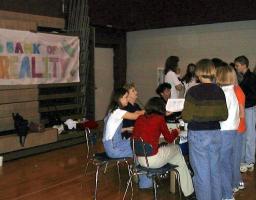 |
 |
The Reality Store is intended to give Elliot County 7th and 8th grade students a sense of the real world. They each are transported forward in time until they are 25 years old. Each student may then have a spouse and a random draw gives them from 0 to 5 children. Each is assigned an occupation and monthly salary based on their current grade point average. Now the fun begins. The students come into the gym where tables have been set up representing some of the stops that they will need to make this month. The first stop is the Bank where they cash their paycheck, make a savings deposit if they wish, and start to deal with this month's expenses. Employees of the local bank branch staff the table and can answer the student's financial questions. They then proceed to the Tax Table where they pay the taxes due on their income.
 |
 |
The students then visit a
series of
required tables to provide for the
month's Housing,
Groceries,
Clothing,
Transportation,
Medical
Expenses, Child
Care, Insurance,
and Utilities.
Each of the
choices,
and expenses had to be consistent with their income and
family.
No
fancy two seat sport cars for store clerks making minimum wage with
five
kids to support. The Medical
table had a wheel of fortune to find out if they had a routine checkup
or something seriously wrong with high expenses. At Groceries
they could chose from several monthly menus. Here most of the
students
ended up picking the basic low cost selection while admitting that they
would prefer better. Some of them discovered that they would
need
to visit the Supplemental
Income
table
for second or even third jobs to make ends meet.
 |
 |
 |
 |
Some of the other tables
included: Contributions,
Recreation,
Health
and Beauty, Pets,
and Adult
Education. Most of the students found
that they had to
economize if they were to make it through the month with anything left
over. The Adult
Education
table
was new this year. Here they would learn the value of
furthering
their education to qualify for a better job and higher pay.
They
may find that they would be charged for their continuing education or
it
may be free for those getting a GED or going to an employer sponsored
training
course. The "price" of this stop included my lecture on the
free
time they would have to give up to get a better job and how it would
have
been better to stay in school in the first place. Each of the
tables
had seniors helping out. One of the girls at my table had a
full
scholarship at the University of Kentucky and encouraged some of the
7th
and 8th graders to go on to college.
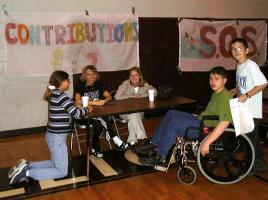 |
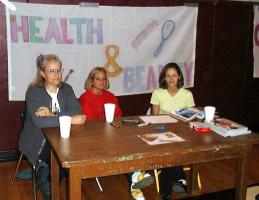 |
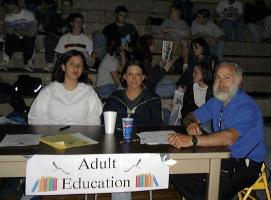 |
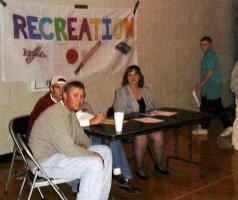 |
Like in the game Monopoly,
at the Chance
table they would draw to find out if they got an inheritance, broke
their
leg, or had some other good luck or misfortune. If they were
very
unlucky and drew a major accident they would be assigned to a
wheelchair,
crutches or be blindfolded for the remainder of their stay in Reality.
The SOS
table was for students who
realized that they couldn't make ends meet. Here they would
be
given
suggestions on to how to reduce their expenses or increase their
income.
Welfare was not an option.
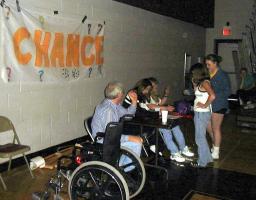 |
 |
The experience seemed to
let the
students see the value of improving
their grades now so that they can go further in their education and be
qualified for a better, higher paying job.
It was clear that the experience had an effect when you listened to
them on the bus on their way home that night. One was heard
to
say
with a tone of desperation in his voice "I need more money.
How
can
I get more money?" He knew that he wasn't going to make it if
he
didn't.
If you have participated in a Reality Store or have other comments I would like to hear them.
Go
to our Science
Fun page
Go to our Travels page
Go
to our Personal
home page
Go
to our Community
page
E-mail Nancy
and
Alan